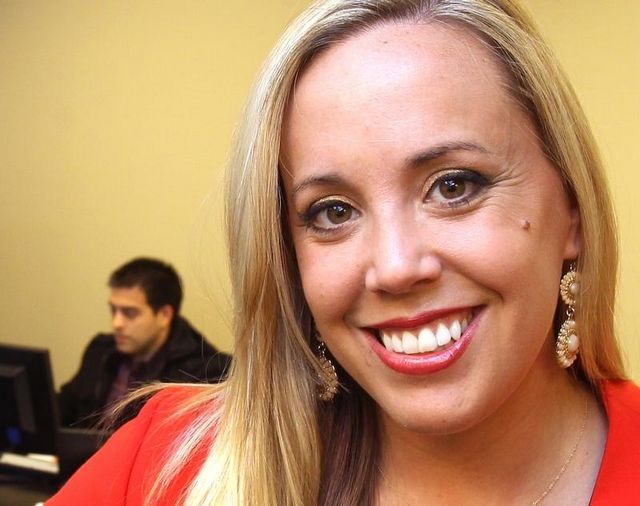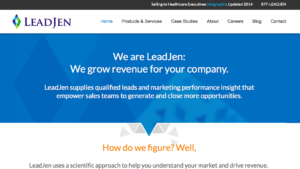

How Lead Generation can impact branding
“Lead generation is the largest live dialog that a company will have with the marketplace, so it makes sense that it also can contribute valuable information to branding efforts.”
Published via businessinterviews.com & written by B.I.
LeadJen is a B2B lead generation company that helps corporate sales and marketing teams drive more revenue and better understand their market. LeadJen’s scientific approach, proven methodologies and market intelligence drives revenue for clients in various industries including healthcare, manufacturing, retail, financial services, life sciences and high tech. Based in Indianapolis, LeadJen is a 2013 Mira Award winner and was recognized as a 2012 and 2013 Inc. 5000 company, a 2012 Indiana Company to Watch and a 2013 Top Workplace.
Founder Jenny Vance has three times been honored by the Sales Lead Management Association as one of the 50 Most Influential People in Sales Lead Management and was named to the list of 40 Under 40 by both Direct Marketing News and the Indianapolis Business Journal.
Jenny Vance also is the founder of PlanSoon, a social network that helps individuals try new things and meet new people.
BusinessInterviews.com: What tips would pass onto a company looking to launch their first lead generation campaign?
Jenny: Marketers often feel that they need to do branding exercises and perfect their website and other marketing materials before embarking on a lead generation program. While it’s important to take an intentional approach to lead generation messaging and list building, it’s equally important that lead generation takes place early in the marketing process. This is because lead generation can uncover valuable information about customers and the marketplace. Lead generation is the largest live dialog that a company will have with the marketplace, so it makes sense that it also can contribute valuable information to branding efforts. To get started, a company should know who they want to target and what kind of information they are looking to uncover.
BusinessInterviews.com: What are some of the most common marketing or lead generation mistakes you see people making and how can they be avoided?
Jenny: The are two main mistakes I see companies making. The first error is thinking they have to have all the answers before starting a lead generation program. Companies need to flip the timing and let lead generation conversations uncover the marketplace information needed to drive marketing efforts. The second misconception that I see is companies thinking that there’s a cheaper and easier way to generate leads. It’s pretty common to see college interns making lead generation calls. Also, some sales managers feel that lead generation is all about volume; the more calls you make, the better. However, successful lead generation is part art and part science. The program needs to be data-driven using proven processes and it should be executed by professionals who are well-trained to achieve the desired outcome.
BusinessInterviews.com: What are some trends in lead generation that you’re excited about or think that our readers should be paying attention to?
Jenny: I’m most excited about using technology in lead generation, and there are new solutions that give really good insight into what is working. Digital marketing isn’t new, but companies now are able to move away from measuring the effectiveness of the telephony aspect of lead generation, which is all about individual performance, to capturing all these live dialogs and interpreting market information and trends. Two other trends that I think will impact lead generation are mobile and social. Both are growing in importance; however, today email marketing and cold calling are what drive results.
BusinessInterviews.com: What was the inspiration behind PlanSoon, a social network that helps people try new things and meet new people?
Jenny: I am a busy executive, and I also have some activities that I’m really passionate about. I like to golf and I’m an avid ballroom dancer. As it turns out, my friends don’t share these same interests. Other social networks plan activities that have specific timelines, and that doesn’t always work out for busy people. Or, the social network assumes you’re looking to find someone to date. I thought, wouldn’t it be great to have a social network just focused on helping people meet others who are interested in their same hobbies and past times. Since that network didn’t exist, I decided to create it myself. On PlanSoon, people can identify their hobby and search for others with the same interests.
BusinessInterviews.com: Can you share some advice when it comes to making the most out of exhibiting at Trade Shows?
Jenny: Marketers spend a lot of time and money on trade shows, hoping that a qualified prospect will walk by the booth and stop in. That’s leaving a lot up to chance. Many of our clients come to us because they want to optimize that investment. We encourage companies to take control of the situation by proactively setting up appointments at the booth or in a meeting room with qualified prospects. These appointment setting calls take place weeks before the trade show and we follow up with prospects to confirm the meeting just before the show. If possible, we get the prospect’s cell phone number and text them a reminder. This helps companies take charge of who they are meeting with and delivers a significant return on their trade show investment.
BusinessInterviews.com: I really enjoyed your blog post with tips on how to get past the gatekeeper and was wondering if you could share some with our readers?
Jenny: It’s really important to have confidence and to understand that what’s relevant to the executive also will be important to the executive assistant. This isn’t true for an operator, though. Operators don’t know the executive and are trained to be gatekeepers, so we try to work with the executive assistant. I’ve found that enlisting the help of the executive assistant is a good strategy. People like to be helpful, so we always view assistants as our ally. Simply asking, “Can you give me some guidance about the best way to reach Jim,” or “Next time you see Jim, would you ask him…” shows the assistant that you’re not trying to work around her. Also, messaging plays an important role. Telling the assistant that you’re working with specific companies that are similar to hers or with executives who are peers to the executive you’re trying to reach, shows that your call is credible.

